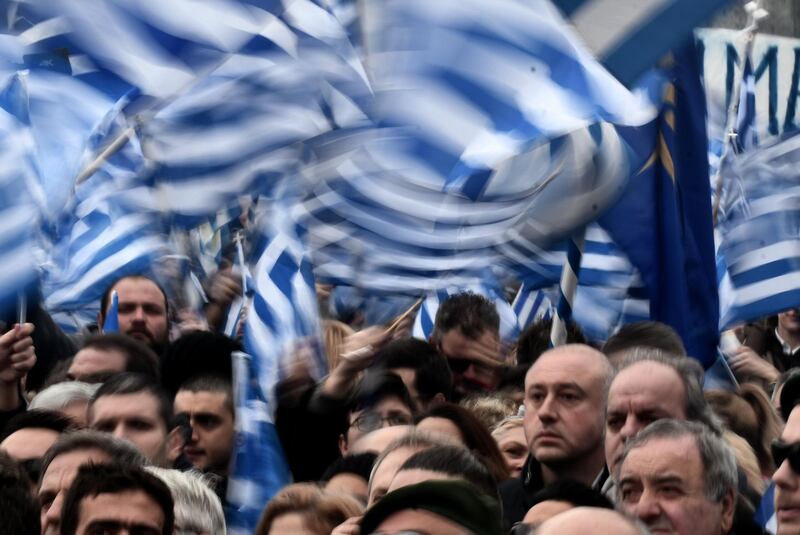Thousands of Greeks in the northern city of Thessaloniki rallied on Sunday to protest against the use of the name Macedonia in any solution to a row between Athens and Skopje over the name of the former Yugoslav republic.
Greece says the name Macedonia implies a territorial claim over its own northern region of that name. The two countries agreed this month to renew efforts to settle the 25-year old row, which has blocked the former Yugloslav republic’s attempts to join Nato and the European Union.
Both countries say they hope to reach an accord by June.
Police said more than 90,000 demonstrators had joined the protest in Thessaloniki, organised by hardline clerics, far-right leaders and Greek diaspora groups.
Protest leaders said at least 400,000 people had turned up.
“We estimate there were at least 400,000 people. It is impressive,” rally organiser Anastasios Porgialidis told AFP.
Some minor scuffles erupted between the protesters and anarchists who had organised a counter-demonstration, prompting police to intervene with tear gas.
The rally drew members of the neo-Nazi Golden Dawn party who had gathered around the statue of Alexander the Great along with local clergy.
Representatives from the main opposition party, New Democracy, were also present despite a tacit order from its liberal-minded leader Kyriakos Mitsotakis to boycott the protests.
After Sunday's rally, however, Mr Mitsotakis hailed the “impressive turnout that proves the particularly great sensitivity of society to the issue”.
Cretans in traditional costumes who travelled from the southern island with their horses, as well as people from northern Greece wearing costumes from the Macedonian wars a century ago, gathered at the White Tower on the Thessaloniki waterfront from early in the morning.
Police said 284 buses had transported people from around Greece to the port city.
Greece and Macedonia returned to the United Nations last week hoping to reach a compromise that could end the 27-year dispute over the former Yugoslav republic’s name.
Greece’s objections to the use of the name Macedonia since the Balkan country's independence in 1991 have hampered the tiny nation's bid to join the European Union and Nato.
“We want to warn our politicians not to dare to betray us. Macedonia is Greek and this is not negotiable,” said protester Dimitris Triantafillidis, 50, a shop owner from the northern regional district of Pieria.
The UN negotiator Matthew Nimetz – a 24-year veteran on the issue – said last week that he was “very hopeful” that a solution was within reach.
Despite the nationalist fervour that is also being fed by Golden Dawn, Greeks appear to be less militant about the name than in the past.
In 1992, more than one million people – 10 per cent of the population – joined a rally in Thessaloniki to proclaim that "Macedonia is Greek".
According to a survey conducted for Greek radio station 24/7 by the Alco polling group, 63 per cent of respondents said they thought it was in Greece’s best interests to seek a mutually acceptable solution at the UN talks.
And the Greek Orthodox Church, which is traditionally opposed to the use of the term Macedonia by Skopje and led the 1992 rally, appears to have distanced itself from Sunday’s gathering.
Its leader Archbishop Leronymos on Thursday reportedly told prime minister Alexis Tsipras that “national unity is needed ... [not] protests and shouts”.
Mr Tsipras, who is expected to meet with his Macedonian counterpart Zoran Zaev at the World Economic Forum in Davos, Switzerland, next week, said in an interview published on Sunday: “If there is an opportunity for a solution, it would be a national stupidity not to make good use of it.”
However, he told Ethnos newspaper that he could understand “the concerns and sensitivities” of the Greeks of the north.
Macedonia is known as the Former Yugoslav Republic of Macedonia (FYROM) at the United Nations, although the Security Council acknowledged this was a provisional name when it agreed to membership.
If a deal is reached at the UN talks, it will be put before Greek parliament for approval, with the government expecting the compromise name to be approved despite opposition within some parties.
According to Macedonian media, Mr Nimetz has proposed five alternatives all containing the name.






